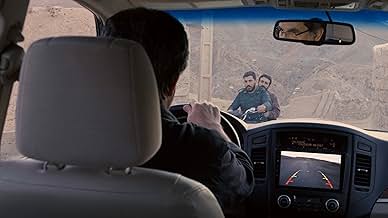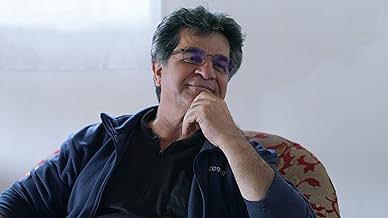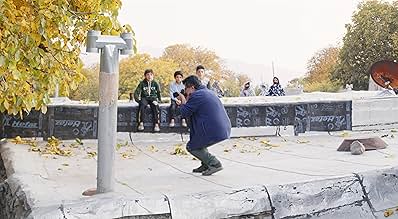PUNTUACIÓN EN IMDb
7,2/10
4,7 mil
TU PUNTUACIÓN
Sigue paralelamente dos historias de amor, donde sus deseos se ven truncados por obstáculos ocultos e inevitables, superstición y mecánica del poder.Sigue paralelamente dos historias de amor, donde sus deseos se ven truncados por obstáculos ocultos e inevitables, superstición y mecánica del poder.Sigue paralelamente dos historias de amor, donde sus deseos se ven truncados por obstáculos ocultos e inevitables, superstición y mecánica del poder.
- Premios
- 4 premios y 8 nominaciones en total
Bakhtiyar Panjeei
- Bakhtiar
- (as Bakhtiar Panjei)
Narges Delaram
- Ghanbar's mother (Madar_e Ghanbar)
- (as Narjes Delaram)
Reza Heidari
- Reza
- (as Reza Heydari)
Aliye Tuzun
- Police
- (as Aliye Tüzün)
Reseñas destacadas
The film "No Bears" starts off simple but becomes more complex as it progresses. Even if you're not familiar with the work of Kiarostami and Makhmalbaf, you can still enjoy it. The director, Panahi, mixes documentary-style and autobiographical elements to create a powerful emotional impact. Panahi, who is at the center of the film, is forced to confront the consequences of his work, both for himself and his collaborators. The final image of the film is sobering and resonates with the unspoken anguish of an artist exiled in his own country, who has had enough. It is clear that the director has little left to lose, and this makes "No Bears" one of the best movies of the previous year.
A masterfully crafted film that showcases the incredible talent of Iranian director Jafar Panahi. Despite facing constant harassment and a six-year prison sentence on baseless charges, Panahi continues to push the boundaries of cinema with his deeply personal and thought-provoking work.
In "No Bears," Panahi plays a fictionalized version of himself as he directs a film remotely from the Iranian village of Joban, near Turkey. When his WiFi goes out, he becomes intrigued by a local ceremony and loans one of his cameras to a villager to document it. The film then follows two parallel tracks: the story of Bakhtiar and Zara, which serves as a reconstruction of a real-life event, and the recording of the ceremony, which opens up a can of worms in the village as it is used as evidence against a young woman accused of having premarital relations.
Throughout the film, Panahi deftly explores themes of truth-telling, social activism, and the blurred lines between reality and fiction. The acting is superb, with Bakhtiar and Zara's tumultuous relationship feeling both realistic and emotionally charged. The cinematography and direction are also top-notch, with the film's remote setting adding to its sense of isolation and tension.
Overall, "No Bears" is a powerful and thought-provoking film that showcases the resilience and determination of its director. It is a must-see for fans of Panahi's work and anyone interested in the intersection of art and politics.
In "No Bears," Panahi plays a fictionalized version of himself as he directs a film remotely from the Iranian village of Joban, near Turkey. When his WiFi goes out, he becomes intrigued by a local ceremony and loans one of his cameras to a villager to document it. The film then follows two parallel tracks: the story of Bakhtiar and Zara, which serves as a reconstruction of a real-life event, and the recording of the ceremony, which opens up a can of worms in the village as it is used as evidence against a young woman accused of having premarital relations.
Throughout the film, Panahi deftly explores themes of truth-telling, social activism, and the blurred lines between reality and fiction. The acting is superb, with Bakhtiar and Zara's tumultuous relationship feeling both realistic and emotionally charged. The cinematography and direction are also top-notch, with the film's remote setting adding to its sense of isolation and tension.
Overall, "No Bears" is a powerful and thought-provoking film that showcases the resilience and determination of its director. It is a must-see for fans of Panahi's work and anyone interested in the intersection of art and politics.
A most excellent movie ! Thoroughly enjoyed it. For sure there were many layers and implicit meanings I missed but that is also what made this film so intriguing. The contrast between the mountain town in Iran and the city in Turkey, all the details, the character extras that clearly showed the cultural differences, I loved that. The border, the trafficking that was implied, the faithfulness to truth of the central actor who is also the director. It's also a movie that celebrates movie making, how storytelling prevails in film, the impact of a story upon the storyteller. It´s a very poignant movie.
Wonderful footage in a documentary style, great story, amazing insight into life on the frontier.
Well worth seeing.
Wonderful footage in a documentary style, great story, amazing insight into life on the frontier.
Well worth seeing.
No Bears is a metafictional exploration by Jafar Panahi, tackling the social and political restraints placed on himself and others. While the subject matter might seem daunting, the film is surprisingly accessible. Despite its gravity, it maintains a humble, understated tone, grounded by Panahi's calm demeanour, honesty, and politeness. Moments of dark-tinged humour-like Panahi reviewing footage accidentally left running on a camera-lighten the tension.
Panahi stars as himself, directing a film about two people attempting to migrate illegally, which is presented as a semi-documentary. In a unique twist, No Bears becomes a semi-documentary within a semi-documentary, blurring the boundaries of fiction and reality. Panahi has relocated to a small village near the Turkish border to direct remotely via webcam, as he was subject to a chronic travel ban at the time. Perhaps he sought proximity to his crew or a respite from the surveillance of Tehran. However, his interactions with the local villagers and the tensions of living near the border create a layered narrative that reflects both the film's themes and Panahi's real-life challenges. The frequent disruptions to his work caused by poor internet signal serve as a fitting metaphor for the control and limitations imposed on his creative freedom.
At its core, No Bears is a film about resistance. Panahi refuses to bow to Iranian authorities' attempts to silence him. His dealings with the villagers mirror his experiences with the regime-both characterised by arbitrary rules, superstitions, and traditions that he quietly defies. Acting as a beacon of reason, Panahi invites viewers to question the power of authoritarian systems, suggesting that their strength lies in collective compliance. The title, No Bears, reflects this theme. Villagers keep the young indoors with tales of bears prowling at night, but no such bears exist-a lie that encapsulates the broader dangers of imagined fears used as tools of control.
Panahi's calm rationality contrasts with the fabrications and self-deceptions around him. He resists not only the idea of leaving Iran to escape its constraints but also the notion that he should be forced to abandon his homeland to live freely. Why should he, or anyone, have to leave to live authentically?
Beneath Panahi's serene exterior lies a quiet yet profound frustration-his inability to fully integrate, to prevent tragedy, or to appeal to others' sense of reason. He is like Lemuel Gulliver, bound by the Lilliputians, constrained by a system of small yet unyielding forces.
Panahi stars as himself, directing a film about two people attempting to migrate illegally, which is presented as a semi-documentary. In a unique twist, No Bears becomes a semi-documentary within a semi-documentary, blurring the boundaries of fiction and reality. Panahi has relocated to a small village near the Turkish border to direct remotely via webcam, as he was subject to a chronic travel ban at the time. Perhaps he sought proximity to his crew or a respite from the surveillance of Tehran. However, his interactions with the local villagers and the tensions of living near the border create a layered narrative that reflects both the film's themes and Panahi's real-life challenges. The frequent disruptions to his work caused by poor internet signal serve as a fitting metaphor for the control and limitations imposed on his creative freedom.
At its core, No Bears is a film about resistance. Panahi refuses to bow to Iranian authorities' attempts to silence him. His dealings with the villagers mirror his experiences with the regime-both characterised by arbitrary rules, superstitions, and traditions that he quietly defies. Acting as a beacon of reason, Panahi invites viewers to question the power of authoritarian systems, suggesting that their strength lies in collective compliance. The title, No Bears, reflects this theme. Villagers keep the young indoors with tales of bears prowling at night, but no such bears exist-a lie that encapsulates the broader dangers of imagined fears used as tools of control.
Panahi's calm rationality contrasts with the fabrications and self-deceptions around him. He resists not only the idea of leaving Iran to escape its constraints but also the notion that he should be forced to abandon his homeland to live freely. Why should he, or anyone, have to leave to live authentically?
Beneath Panahi's serene exterior lies a quiet yet profound frustration-his inability to fully integrate, to prevent tragedy, or to appeal to others' sense of reason. He is like Lemuel Gulliver, bound by the Lilliputians, constrained by a system of small yet unyielding forces.
Telling the truth is difficult for Iranian filmmakers. You have Government control on one hand (the real tale of Panahi remotely directing a film being shot in Turkey while stationed on the borders of Iran as he is not allowed to leave the country) and you have quaint traditions on the other (in the Iranian villages on the border) that often lead to tragedy. However good your intent, the road is bumpy and leads you to a sad, nihilistic end. Intelligent filmmaking that captures the difficulty of renowned filmmakers to capture the Kafkesque ground reality in Iran and the frustrations of Iranian nationals today. Deserved the Special Jury Prize at Venice.
¿Sabías que...?
- CuriosidadesActually, the entire scene shot in Istanbul Kadikoy, not in Turkish border town.
Selecciones populares
Inicia sesión para calificar y añadir a tu lista para recibir recomendaciones personalizadas
- How long is No Bears?Con tecnología de Alexa
Detalles
Taquilla
- Recaudación en Estados Unidos y Canadá
- 167.333 US$
- Fin de semana de estreno en EE. UU. y Canadá
- 6173 US$
- 25 dic 2022
- Recaudación en todo el mundo
- 1.196.288 US$
- Duración
- 1h 46min(106 min)
- Color
- Relación de aspecto
- 1.85 : 1
Contribuir a esta página
Sugerir un cambio o añadir el contenido que falta























